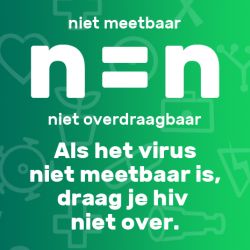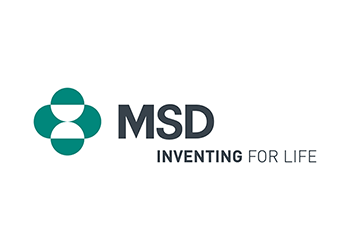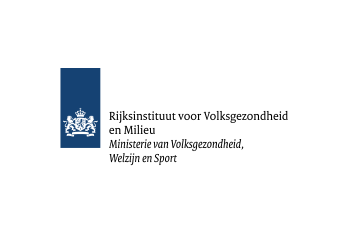Would you like to know what your chances are of contracting HIV? And what about your basic knowledge of HIV and the risk of transmission?
In brief:
- HIV can be transmitted by having sex, intravenous drug use, blood contact, and from mother to child
- HIV cannot be transmitted by having sex if the person has a suppressed virus
- HIV cannot be transmitted by kissing, coughing, sharing a cup, touching someone, or from a toilet seat
- There is no risk of HIV transmission in normal daily life (e.g. at school or work), even if someone’s virus is not suppressed. In healthcare settings, the normal measures are sufficient, someone with HIV does not need to be treated differently
- In the case of an accident, PEP can be given to prevent HIV infection developing, preferably as soon as possible, but always within 72 hours
- PrEP can be taken preventively to avoid HIV
- There is still no vaccine for HIV
How can you transmit HIV?
HIV is mainly found in blood, semen, vaginal fluids and breastmilk. The virus can also be found in other bodily fluids, but in such low concentrations the risk of transmission is zero. HIV can be transmitted by the following routes:
Sex
HIV can be transmitted by having sex without a condom, or sexual activities that involve semen, vaginal fluid, and/or blood being absorbed into the body. HIV can only be transmitted if the virus is not suppressed. The risk is greatest with anal sex, less with vaginal sex and minimal with oral sex. The risk of transmission depends on several factors: e.g. whether someone has open wounds, whether someone has an STI, and whether someone is top (penetrator) or bottom (penetrated). So it is not possible to calculate an exact risk of transmission. Good to know: if someone has HIV but takes medication and the virus is suppressed, that person cannot transmit HIV (the risk of transmission is then zero).
How can’t you transmit HIV?
“At first, I worried about infecting other people. I worried more than the people around me did. Especially when I had contact with children. They are so vulnerable, after all. I felt really dirty and I was afraid to touch my brother's baby.
And I wondered what would happen if a child accidentally scratched me. When someone had to cough after I'd just kissed them, I would think it was my fault she was coughing. Now I just wonder what I was worrying about.“
It is not possible to transmit HIV through swimming, sharing cups, French kissing, personal grooming or administering first aid. You don't have to take anything into account during everyday interaction. In order to transmit HIV, a certain amount of virus must be present. You can't transmit HIV through saliva, sweat, snot or tears: they don't contain nearly enough virus. So there is no need to take special measures at home, school, work or anywhere else.
People with HIV can do their work without risk of infecting colleagues and clients. Wherever that is, e.g. healthcare, catering, education, or the food industry. Adhering to the relevant hygiene guidelines is sufficient. These guidelines are designed to prevent the transmission of infectious diseases; not only the transmission of HIV, but also hepatitis B or C, which are much more easily transmitted. If people stick to these guidelines, there is no risk of transmission. The RIVM (National Institute for Public Health and the Environment) has produced a whole series of LCI (National Coordination of Infectious Disease Control) guidelines on infectious disease control, including the LCI guideline on HIV infection.
Risk of transmission with a suppressed virus
 A person with HIV who has not been treated, has thousands to millions of virus particles in every millilitre of blood. Virus particles means HIV RNA. By using HIV medication, the level of HIV in the body (viral load) is reduced until the virus is no longer detectable in the blood. This is called an unmeasurable or undetectable viral load. Undetectable means that there are less than 50 virus particles per millilitre of blood. It has now been established that this amount of virus particles cannot cause a new HIV infection. Undetectable = untransmittable: U=U.
A person with HIV who has not been treated, has thousands to millions of virus particles in every millilitre of blood. Virus particles means HIV RNA. By using HIV medication, the level of HIV in the body (viral load) is reduced until the virus is no longer detectable in the blood. This is called an unmeasurable or undetectable viral load. Undetectable means that there are less than 50 virus particles per millilitre of blood. It has now been established that this amount of virus particles cannot cause a new HIV infection. Undetectable = untransmittable: U=U.
When the virus is suppressed but still detectable, as long as your viral load is less than 200 virus particles per millilitre of blood, you cannot transmit HIV. So your viral load can be suppressed but still measurable (your viral load is higher than 50 but lower than 200 virus particles per millilitre of blood). Then U=U still applies and you cannot transmit HIV. So when you have HIV, it is important to know the level or measurability of the viral load.
Conclusion: people with HIV who have been successfully treated with HIV medication, meaning their viral load is suppressed or unmeasurable, cannot transmit the virus to others. Even when they have sex without using a condom. The Hiv Vereniging is running the n=n campaign: niet meetbaar = niet overdraagbaar (in Dutch). This is the Dutch translation of the international U=U message: Undetectable means untransmittable. Read more here about the U=U campaign.
Been at high risk in the last few hours?
Then you can start PEP treatment, preferably within 2 hours, but no later than 72 hours (the sooner the better). Go to an HIV treatment centre, the GGD (Municipal Health Centre) or Accident & Emergency. PEP is the abbreviation for post-exposure prophylaxis, or the prevention of infection after exposure to HIV. PEP reduces the risk of HIV settling in your body. It is a preventive treatment, which means you use HIV medication for 4 weeks to prevent a chronic HIV infection.
The costs of a PEP treatment are covered when you have a Dutch health insurance. It will be deducted from your eigen risico (the excess that has to be paid for health costs). If you don't have a Dutch insurance it will cost you €1,000.
HIV-test
If you think you might have HIV, you can take an HIV test. Click here to read more about how this type of test works and where you can get tested.
Not sure if you were at risk?
You can talk to someone on the Aids Soa Infolijn (AIDS/STI Helpline) if you're not sure whether you were exposed to HIV. Call 0900-204 2040, Monday to Wednesday: 09.30-15.30; Thursday and Friday: 13.30-15.30. The costs are 10 eurocents a minute plus possible charges by your provider. Or send your question to This email address is being protected from spambots. You need JavaScript enabled to view it. (receive an answer within 2 working days). They can help you work out what risks you have run. If you are a man who has sex with men, you can do a risk check on mantoman.nl. There is also a symptom checker at hebikhiv.nl. Soatest advieschat is a new service you can go to for advice. You can ask your questions there any time of the day.
PrEP
PrEP (pre-exposure prophylaxis) can be used to prevent HIV infection. Read more about using PrEP to prevent transmission of HIV at Prepnu.nl.
Vaccination
Studies are currently underway to determine whether HIV can be prevented by a vaccine. The results of the studies are encouraging, and there is a chance an effective vaccine will be found. Updates on vaccine research are one of the things on the medical blog (in Dutch).
Fact and fiction!
Questions sometimes arise about the transmission of HIV in day-to-day stuff. So here's a list of the ways you definitely can't transmit HIV.
- Kissing or French kissing. Your saliva contains far too little virus to infect someone.
- Sneezing, coughing or sniffling. Your sneeze, mucus and snot contain far too little virus to infect someone.
- Shaking someone's hand, giving a massage or being massaged. HIV cannot penetrate undamaged skin. If you have a graze or wound with a scab on it, there's nothing to worry about. If you both have an open wound there is still only a very small risk. Blood flows out from a wound. That is designed to prevent infections. So HIV doesn't get into a wound that easily.Niet door een toilet, theekopje, ander servies, bestek of beddengoed te delen. Het virus kan niet in de lucht blijven leven.
- By sharing a toilet, teacup, other crockery, cutlery or bed linen. The virus cannot survive in the air.
- Receiving dental treatment, getting or giving first-aid. The normal hygiene measures taken by a dentist or paramedic are sufficient. The patient visiting the dentist after you is not at risk either.
- From insect bites; sharing food or drinking from the same glass (so you can share a cookie); swimming pool water; taking a bath together, a sauna or a steam bath.









